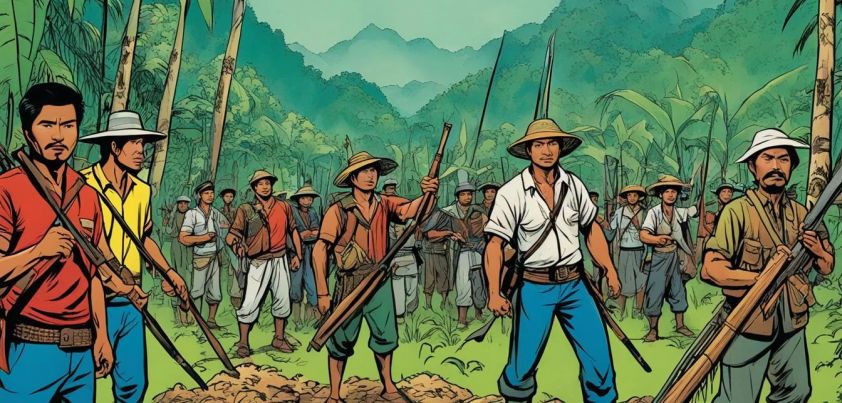 This story by Rony V. Diaz takes place during the Philippine Hukbalahap Rebellion at the end of World War 2. The “Huks”, originally a peasant resistance who fought the Japanese, embraced communist principles and turned their attention to overturning the country’s feudal farming system. The heir to a large landholding mysteriously commits suicide. It is unclear whether he acted because of a promise made to break up his family land, or uncertainty and fear about doing so. The answer may lie in a cryptic poem confiscated by police. Major themes include tradition, feudalism, wealth vs. poverty, social change, suicide.
This story by Rony V. Diaz takes place during the Philippine Hukbalahap Rebellion at the end of World War 2. The “Huks”, originally a peasant resistance who fought the Japanese, embraced communist principles and turned their attention to overturning the country’s feudal farming system. The heir to a large landholding mysteriously commits suicide. It is unclear whether he acted because of a promise made to break up his family land, or uncertainty and fear about doing so. The answer may lie in a cryptic poem confiscated by police. Major themes include tradition, feudalism, wealth vs. poverty, social change, suicide.
At the dinner party the night before his suicide, Virgilio is clearly not convinced about the need for social reform: “Why change?” [he] asked. “The pre-war order had brought prosperity and democracy. What you call feudalism is necessary to rebuild the country. Who will lead? The Huks? The young turks of the Liberal Party? All they have are ideas; they have no capital, no power.” Three years earlier, he had been pressured by Huk leader Carding to promise that, provided his Aunt Clara was adequately provided for, he would leave the hacienda to his tenants because it was probably the right thing to do.
The poor man appears to have been caught between a rock and a hard place. On the one hand he faces pressure, and perhaps threats, from Carding to keep his promise. On the other, he is not only uncertain if this is the right thing to do, but Clara’s marriage to the ironically named black-marketeer Honesto has complicated matters. Honesto has political ambitions and plans to leverage the wealth and connections of the family to achieve them. He would not take kindly to any attempt to break up their landholdings.
Original Text / PDF (4,700 words)